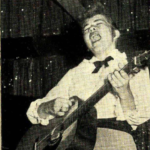
About
Born: April 20, 1938
“Alis Lesley, the female Presley” was a stage name used by a teenage performer from Arizona between 1956 and 1959. A biography printed in a program book from her 1958 appearances in Australia indicate that she was born on April 20, 1938, in Chicago, and then moved to Phoenix, where she studied theater in school. The biography also indicates that Lesley was discovered by Kathryn Godfrey, Arthur Godfrey’s sister, and began making local media appearances shortly thereafter. Bandleader Buddy Morrow is credited with helping her publicize her “female Presley” persona.
“Alis” slicked back her hair to resemble a pony-tailed version of male Elvis’s pompadour, wore sideburns and pants, and engaged in over-the-top stage antics. She apparently only ever released one single: “He Will Come Back to Me” / “Heartbreak Harry,” on Era records in 1957. The two sides were closely modeled on Presley’s singing style, and the record apparently failed to make much of an impression on critics: “Lesley rhymes with Presley,” Billboard noted, “and that is the gist of this disc.” An unreleased demo recorded at Sun Studios and credited to “Alice Leslie” also appears to be by the same performer.
Despite the fact that she was not well-known as a recording artist, numerous stories about Lesley appeared in newspapers and magazines, including the Boston Globe, Chicago Tribune, and Washington Post. Tours in Australia—where she appeared with Little Richard, Gene Vincent, and Eddie Cochran as part of a Lee Gordon package tour—and later in Canada brought international press. Many of the reports came from cities where she performed at clubs, and most of the fascination was with her appearance and stage antics. Lesley usually performed barefoot, claiming shoes made her feel inhibited. An account of one of her shows reports that, clad in yellow satin pants, Lesley “stood on the piano, lay on the floor, wrestled with the microphone, embraced the string bass—and sang.” Another noted that “using guitar and movable anatomy … she makes ‘Elvis The Pelvis’ look like an elderly, arthritic Salvation Army drummer.” Men’s magazines including Real Men and Tempo also contained feature articles on Lesley. These profiles hinted that although she dressed in masculine clothing and sang about “Heartbreak Harry,” Lesley was still marketed with an audience of heterosexual men in mind.
Following appearances in Quebec in 1959, the historical record on Alis Lesley effectively ends. She once told a reporter that she did not want to grow old in show business, and it appears she meant it. She seems to have granted only one very brief interview since 1959: excerpts of it appeared in 2002 in the liner notes of Bear Family’s Memphis Belles: The Women of Sun Records. Lesley reveals to Hank Davis that after her final tour, she returned to Arizona to care for her ailing mother, worked as a teacher and a missionary after college, continued to do some occasional vocal work and coaching, and retired in 1980.
“He Will Come Back to Me” / “Heartbreak Harry.” Era 45-1034 (1957).
“Why Do I Feel This Way?” [Era?], unissued.
“So Afraid.” [Era?], unissued.
“Don’t Burn Your Bridges.” [Era?], unissued.
“Handsome Man” [as Alice Leslie]. Sun, unissued.
“Pandemonium over Strip-Singer,” Sydney Morning Herald, 5 October 1957.
Hal Eaton, “Going to Town,” Long Island Star Journal, 14 November 1956.
“Pandemonium over Strip-Singer,” Sydney Morning Herald, 5 October 1957.
Ronald McKie, “…But Alis Prefers Horses,” Australian Women’s Weekly, 16 October 1957
“A Better Pelvis,” Real Men, February 1958, 46–47.
Hank Davis, Memphis Belles: The Women of Sun Records (Hambergen, Germany: Bear Family Records, 2002).
